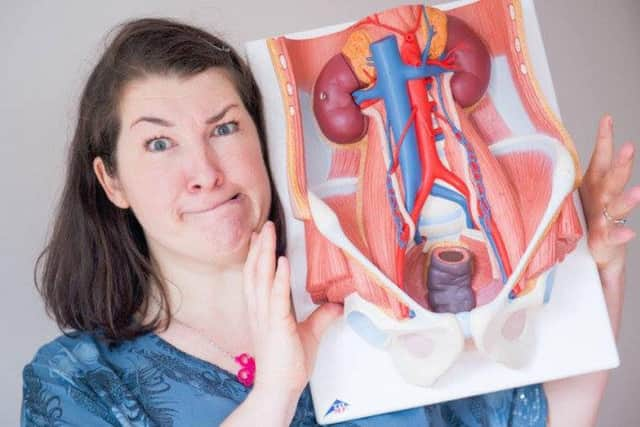Scotland needs a Health Champion like Elaine Miller to help free women from a life blighted by incontinence – Susan Dalgety


The timing couldn’t be better, unlike my bladder which has the unfortunate habit of wanting to empty itself the minute I get on a Lothian bus. Tuesday is World Menopause Day.
I know, who celebrates the menopause? That period in a woman’s life when the hormones that control every aspect of our physiology and psychology suddenly disappear, leaving us emotionally bereft and physically exhausted, with thinning hair, a big belly, and unable to sleep at night because of hot flushes, tortured by angst at the thought of our impending death. That menopause?
Advertisement
Hide AdAdvertisement
Hide AdThe day was designated by the International Menopause Society to raise awareness about it, and crucially to look at ways to improve life for women in “mid-life and beyond”.
The “change” as my mother’s generation described it – always in hushed, bitter tones – has suddenly become a popular topic, even among politicians, no doubt mindful of the power of the women’s vote.
The Westminster All Party Parliamentary Group on Menopause published a report earlier this week with 13 recommendations to support women going through the “change” – including health checks for all women over 45 to help early diagnoses.
The Scottish Government’s health plan, announced to great fanfare last year, puts the menopause centre stage, along with the other pesky biological factors that affect a woman’s health, from periods to pregnancy. But more of that later.
And First Minister Nicola Sturgeon is the new poster girl for menopausal women. In an interview last year, she spoke for many when she admitted she felt nervous talking about it. “It's not the kind of thing I feel instinctively comfortable talking about – I think because it is so intensely personal, and there's still a lot of stigma around it,” she said.
In an uncharacteristic moment of uncertainty, she admitted she was anxious about its effect on her “… given the public nature of my job – how I am going to cope with the impact of that, what's it going to be like”.
Well, if she hasn’t found out already, it is going to be tough. And one of the worst aspects is urinary incontinence. That terrible infliction that leaves you cross-legged, in tears as hot urine gushes between your legs as you put the key in your front door. Or those little leaks when you laugh, or bend, or do any form of physical activity other than sitting on the sofa watching Loose Women.
Urinary incontinence could affect as many as 60 per cent of women, as a survey of American women from 2015-18 shows. The figure used in Scotland is one in three, but as clinician and comic Elaine Miller explained to me, no-one is really sure of the number. “Most of the literature works off a convention that it is one in three women. If there is a reference for that I can't find it, I think it came about because we thought ‘that's terrible, we must do something about that’, when, actually, the issue is much, much worse than we expected.”
Advertisement
Hide AdAdvertisement
Hide AdElaine, a fellow of the Royal Chartered Society of Physiotherapy and a “recovered’ incontinent, is also an award-winning comedian. Her show Gusset Grippers is a hilarious look at incontinence – and crucially how to cure it.
“Nearly three-quarters of women with stress incontinence can get dry in three months of doing pelvic floor exercises,” she told me. “So why on earth isn't there a public health campaign?”
And she goes on to describe what such a campaign could look like. “Use a smart phone to nudge women to do exercises, remind them to sort out their bowels, keep drinking water, don't put up with the leaking. Nudge theory works for this messaging.”
If it is that simple, and relatively cheap, and will help more than half the population, surely tackling incontinence is central to the Scottish Government’s health plan for women? Er, no. I found two references to incontinence in the document, pages 57 and 58, if you’re interested, and both were simple definitions.
Elaine suggests that one of the reasons incontinence is not properly recognised as a public health emergency is because no-one has asked women the right questions.
She explained: “Amanda Gard, a researcher at Abertay University, found that only four per cent of women will voluntarily disclose that they leak. How can the government expect to fix this problem when we don't give them a chance to share it? Women are told that leaking is normal after a baby or when you get older, that's just not true.
“Leaving women to suffer or have their lives limited by conditions which are common, understood, preventable, manageable and curable because we haven't bothered to address them is not very nice. Unless, of course, you don't mind women's suffering.”
At the SNP conference last weekend, the party backed plans for “period leave” for women with extreme menstrual symptoms, but only if and when Scotland is independent.
Advertisement
Hide AdAdvertisement
Hide AdImagine instead if they had supported a public information campaign to relieve incontinence, and funding for more physiotherapists like Elaine. Practical solutions to an everyday problem that could change the lives of countless women today, not sometime in a mythical future.
And here’s another thought. Fourteen months after the women of Scotland were promised a Health Champion to “help close widening gender gaps in care and treatment”, the post still remains unfilled.
Can I suggest Elaine Miller for the job. She knows the inside of a woman’s body better than most, she doesn’t mind talking about it in public, and she’s very funny. The perfect candidate.
Comments
Want to join the conversation? Please or to comment on this article.
